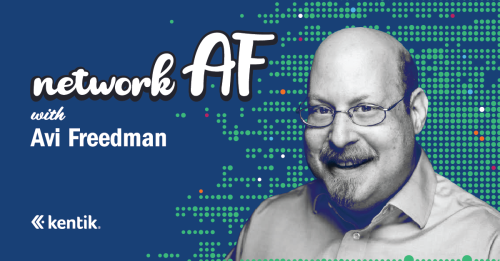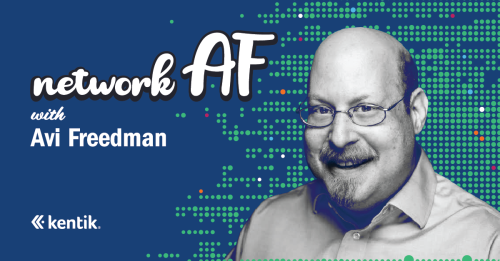Network AF, Episode 5: Building relationships as an internet analyst with Doug Madory

Summary
Listen to our host Avi and guest Doug Madory’s conversation around internet analysis. Doug shares how he got into technology, his career in the Air Force, and dives into what it’s like building relationships with the press and working with them as an internet analyst.
Network AF welcomes Doug Madory to the podcast.
Doug is a veteran, a researcher, a writer and Kentik’s director of internet analysis. With his start in the U.S. Air Force within its Information War Center, Doug has now been working in the networking industry for 12 years.
After the Air Force, Doug went on to work for Renesys, which was acquired by Dyn, which was later acquired by Oracle. At each of these companies, he served as an expert network researcher, using data to help interpret events, human behavior and internet incidents. At Kentik, Doug focuses on turning networking data into meaningful insights for customers and sharing his research with the industry and curious, everyday digital citizens.
During this episode of the podcast, Avi and Doug discuss:
- How Doug’s interests led him to internet analysis
- How Doug builds relationships while communicating technical networking data
- How analyzing traffic flow presents opportunities for investigative journalists to tell stories
- And the effects of internet shutdowns
Getting his start
From Poughkeepsie, New York, Doug gained an interest in technology at a young age. His father worked at IBM for 30 years, writing code and working on mainframes. As a result, there were always computers around the family home for Doug and his brother to learn on.
Doug joined the Air Force as a network engineer on a team running the IT infrastructure for intelligence operations. He recounts his appreciation for Cisco’s certification programs, which he says helped his skill and technical understanding. Eventually, he made his way to head of the Solaris Administration for the Information War Center, in charge of 55 airmen who needed to be able to deploy in a moment’s notice.
BGP as a professional gateway
Doug credits some of his professional growth and learnings from his early days at Renesys, where he says he did a lot of BGP analysis. He jokes that he “started off as the guy who would just write reports that nobody wanted to write, and do data QA that people didn’t really want to do.” This turned into writing opportunities that strengthened his ability to translate this information clearly, and became a major part of his professional path.
On the subject of how this was all possible, Doug talks about being mentored as an “understudy” to Renesys’ founder Jim Cowie, collaborating with Jim and adding more detail to Jim’s materials.
Avi also asks Doug about his focus on internet outages, shutdowns and internet development. Doug says he writes about “gory routing incident autopsies.” He says he’s also is fascinated by a trend in the world where governments will shut down their internet to prevent students from cheating on exams.
On internet shutdowns
Given the nature of this type of work, Doug’s orbit becomes entangled with relevant crises like the Arab Spring and other internet shutdowns that governments like Egypt imposed on their citizens. At Renesy, he had the tools to dig into BGP data and interpret what was happening. He says that the company didn’t see its role as being a flag carrier for human rights so much as having the ability to give technical analysis and make sure everybody got the story accurate. In a stroke of luck, Doug received a tip about the Egyptian internet being shut off from a network engineer a day in advance, giving him a day’s notice on the Egyptian revolution.
He also references some of his favorite journalism projects, including working with The New York Times on the North Korean and Myanmar outages.
What’s ahead
Doug is currently excited about learning new skills and growing his understanding of synthetic monitoring research for performance measurement. This will help him help Kentik customers and interested journalists to easily interpret and tell their own stories of what’s happening across the internet.
If he could tell his younger self something, Doug says he would’ve never been able to predict this amazing internet data analysis and interpretation job could exist or that there would be so many in-depth analysis tools. In addition to sharing general advice on building relationships and learning, Doug tells the audience to always ask questions from a place of humility and trust that the intrinsically passionate people in this space will respond in kind.
Doug’s parting advice is to be someone who helps others and to try to find people at the right moment. You can find Doug on Twitter, LinkedIn and the Kentik blog.



